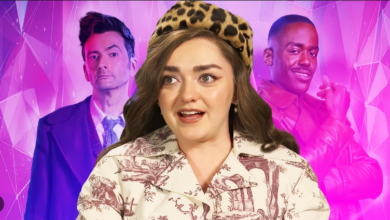Doctor Who’s Fourteenth Doctor Being Different From the Tenth Is for the Best

David Tennant recently confirmed that his Doctor Who return will not be a simple rehash of the Tenth Doctor, which makes sense for the character.
In Nov. 2023, David Tennant returns to Doctor Who in an unprecedented move for the sci-fi series. While past Doctors have returned before, and “The Day of the Doctor” may have fleetingly featured Tom Baker as a new incarnation of the Doctor, this is the first time that a former Doctor Who star has returned to play a new incarnation as the series’ lead. Jodie Whittaker’s final episode, “The Power of the Doctor,” ended on the surprise reveal of Tennant’s return, when the Thirteenth Doctor’s regeneration resulted in the Doctor gaining a familiar face. However, this isn’t the return of the Tenth Doctor.
As reported by Radio Times, David Tennant stressed the Fourteenth Doctor isn’t the Tenth Doctor. “The Doctor’s been three different people in the meantime, so I’m not necessarily the same version of the Doctor that I was before,” the Doctor Who star said. This confirms fan suspicions that the Fourteenth Doctor’s persona will, in some way, differ from that of the Tenth Doctor. They may look the same, but they are two distinct incarnations, each shaped by the experiences the Doctor has had up to that point in their life. This distinction is far better for both the character and Doctor Who as a whole.
The 10th Doctor Was More Narcissistic Than Other Incarnations

The Tenth Doctor quickly became many Doctor Who fans’ favorite incarnation of the Time Lord. He was probably his own favorite incarnation too. Though he will always be remembered as fun, manic and gleeful, perfectly embodying the Doctor’s spirit of eternal optimism, he was also known for his vanity and eventual narcissism. The Doctor has always been somewhat arrogant, his view of himself bolstered by his own intelligence and unencumbered by others’ varying opinions of him, but the Tenth Doctor pushed this further than his previous selves.
Towards the end of his life, the Tenth Doctor’s narcissistic attitude developed into a full-blown god complex. The 2009 Doctor Who special “The Waters of Mars” saw the Tenth Doctor changing a fixed point in time by saving the crew of Bowie Base One. As the last of the Time Lords, he came to believe the laws of time were his to control, dubbing himself the Time Lord Victorious. He would later go on to rage against his impending regeneration in “The End of Time,” having previously evaded regeneration in the Season 4 finale, “Journey’s End.” The Eleventh Doctor would later put this action down to his past self’s “vanity issues.”
The Tenth Doctor also seemed to enjoy the attention this particular face attracted. This incarnation of the Doctor indulged in romantic or flirtatious behavior more than other Doctors with the women he met in his travels. Clearly, the Tenth Doctor enjoyed being the Tenth Doctor. However, as David Tennant himself pointed out, the character has grown over the course of his subsequent incarnations. The Fourteenth Doctor should seem more mature and less vain than Tennant’s previous iteration of the Time Lord.
The Doctor Has Grown a Lot in Their 11th, 12th and 13th Incarnations

With each regeneration seen on Doctor Who, the Doctor appears to take forward the lessons of their past life and grow beyond the person they had once been. Matt Smith’s Eleventh Doctor was still as whimsical and excitable as the Tenth Doctor, but his jovial nature was often used to mask the graver nature that lurked just beneath the surface. The Eleventh Doctor had come to terms with the many losses he had endured throughout his long life, but still carried that pain with him. He also resisted romantic entanglements with his companions, except in the case of River Song. A more mature and genuinely loving relationship developed between the Doctor and River, even if they each experienced it in a different order.
Peter Capaldi’s Twelfth Doctor showed the most growth of any modern Doctor throughout his tenure. In some ways he was the inverse of Smith’s Eleventh Doctor. Whereas the Eleventh Doctor was outwardly warm and fun, but was masking a greater internal darkness, the Twelfth Doctor could often seem cold and uncaring, yet was one of the kindest and most merciful Doctors at heart. He worried about whether he was truly a good man. He did his best to help Missy overcome her villainous nature. When the Twelfth Doctor made his last stand against the Cybermen in “The Doctor Falls,” he told the two Masters who were with him that he did what he did, even when victory was impossible, simply because it was kind.
Following on from the experiences of the Twelfth Doctor, Jodie Whittaker’s Thirteenth Doctor was perhaps the Time Lord’s most empathetic incarnation. She remained as socially awkward as the Doctor had ever been, but was clearly more in tune with her companions’ emotions deep down. This incarnation brought the Doctor’s deeply caring nature to the surface, having come to terms with the sort of person she is through the struggles she endured in her previous lives in the preceding seasons of Doctor Who.
The 14th Doctor Allows David Tennant to Explore the Time Lord’s Growth

The journey that the Doctor has been on since the end of the Tenth Doctor’s life has paved the way for David Tennant to explore new aspects of the Fourteenth Doctor. While the Tenth Doctor was famously reluctant to face his death, his subsequent incarnations have embraced death and regeneration as a natural part of life. Each has demonstrated a willingness to let go of their time as the Doctor to make way for the next incarnation. The Fourteenth Doctor may have overcome the Tenth Doctor’s vanity and arrogance, finding peace with his place in the greater ongoing story of the Doctor.
The Doctor’s development since their 10th incarnation also offers David Tennant the opportunity to play a more nuanced and mature version of the character, delivering something noticeably different from his previous work on Doctor Who. Given Tennant’s range as demonstrated by his work on other series such as Broadchurch, Good Omens and Staged, to name but a few, playing a different Doctor would allow him to create an exciting new vision of the classic sci-fi character. With the added weight of his recent lives, the Fourteenth Doctor could be Tennant’s best version of the Doctor yet.





